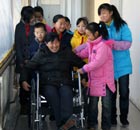Society
China's Internet activity moves society forward
(Xinhua)
Updated: 2010-03-03 22:22
 |
Large Medium Small |
BEIJING - As the number of China's netizens swells and the time they spent online increases, Internet has become a platform for Chinese people to vent their social and political opinions.
By the end of 2009, the number of Chinese Internet users reached 384 million, or 28.9 percent of the total population, according to the China Internet Network Information Center (CINIC).
Cao Delong, a 33-year-old event planner in Beijing, is an active Internet user. The first web postal Cao logged in everyday was the BBS established by residents in the Wanxianxintian community, where he lived.
| ||||
Cao's neighbors and tens of thousands of people living around the area in the Chaoyang district in Beijing were disgusted by the smell for more than one year.
In 2009, a widely-circulated online article titled "An adventure to Gaoantun waste treatment plant -- source of the unbearable smell" caught the attention of the media and then forced the local government to apologize to the residents and install a deodorizing mechanism in the incinerator.
According to a recent survey conducted by the CINIC, 56.1 percent of the country's netizens often posted their opinions online, while 81.7 percent of them followed social news events more closely because of the Internet.
The Internet expands channels for the public to supervise government work and voice their opinions, which forces the government to improve services and correct wrong decisions, said Yao Yuzhou, Party Chief of Tongling City in east China's Anhui Province.
"Suggestions netizens post online usually reflect the ideas of ordinary people," Yao, also a deputy of the National People's Congress (NPC), China's top legislature, said before the opening of the NPC annual session.
Last year, China witnessed several Internet sensations that made headlines. But only after netizens drew focus to the wrongdoing were the authorities forced to investigate the cases in a transparent way.
These cases included the "hide-and-seek" case in southwestern Yunnan Province, in which a 24-year-old prisoner died allegedly during a "hide-and-seek" game; a car racer accident in which a young man was killed after being hit by a car speeding through the streets of Hangzhou in eastern Zhejiang Province; and the entrapment scandal in Shanghai where a taxi driver claimed he was trapped by local management authorities and cut off his finger in protest.
The authorities involved in the car accident and entrapment scandal apologized to the public. And netizens were even invited by the local government to investigate the controversial death of the inmate in the "hide-and-seek" case.
Signalling the importance of the Internet in politics, three netizens, whose real names were Liu Hengxin, Wei Shaojun and Jiang Jianfeng, were named political advisors in Bozhou of Anhui Province in January.
Analysts said it was an unprecedented sign of "netizens stepping out of virtual space into the real world's political arena."
Even China's high-ranking officials went online to listen to public opinions and exchange ideas.
Premier Wen Jiabao said he surfed on the Internet almost everyday to read netizens' comments. "Netizens represent a large social group and they are from all walks of life," he said in an online chat with Internet users last week.
Wen said netizens helped him as people at the grassroots could judge government work and help the government improve policies.
It was the second time for Wen to go online to communicate with the public. The premier had his first ever online chat last February, and he said last week he would chat with the public online again.











